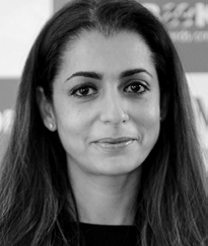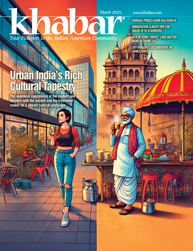Quarantine Quartet

Violinist Sheela Iyengar is a member of the Atlanta Symphony Orchestra (ASO). Her husband and two children are also musicians. “I think I could be the only female Indian musician in any professional symphony orchestra,” she says. “If that is not the case, then I certainly am the first!” She talks about the trials and triumphs of her musicianship, micro concerts with her fellow housebound instrumentalists, not being a Tiger Mom, and how you also can learn to play an instrument—from your couch.
The economic upheaval spawned by the pandemic has affected all forms of art and industry. How worried are you about the future of the ASO?
As the coronavirus has limited large gatherings like concerts at Symphony Hall, the near future is uncertain for the ASO as it is in many industries. However, I am optimistic that we will find a way to return to live performances in a safe manner. Our hope is to take the stage again this September while maintaining safety guidelines. Our patrons, board members, and donors have risen to the occasion. They have been very generous, and we are extremely grateful for their support. While the remainder of the 2019/20 season has been canceled, everyone can join the Atlanta Symphony, where you can view past performances, including performances by legendary artists like violinist Joshua Bell and pianist Lang Lang, on the “ASO Virtual Stage.”
On an uplifting note, the internet is flooded with delightful musical productions by amateurs. You have a family of skilled musicians—tell us about your in-house micro concerts.
During times of uncertainty and anxiety, we need music more than ever. It brings joy and peace to our souls and helps us focus on all that is beautiful in this world. As musicians, performing our instruments allows us to express the many emotions caused by these circumstances, and communicate with our listeners on a level deeper than words can convey. I feel fortunate that I have three family members with whom to make music: my husband, who is the ASO Associate Principal Second Violinist; my daughter, violinist and student at Rice University’s Shepherd School of Music; and my son, an accomplished pianist. We posted our first video of the Bach Concerto for Two Violins and piano (first movement), and we are working on more.
Excelling at an instrument requires an exceptional measure of discipline and tenacity. Are you a Tiger Mom who does not permit bathroom breaks during practice? What guidance do you offer your children?
I am absolutely not a Tiger Mom! While discipline is certainly required, I think the whole idea is to transfer the love of music to the next generation. When my children were younger, I played a lot of classical music in the car while we drove around to places. When they started playing their instruments, I attended their lessons (I actually taught my daughter myself for many of the early years) and practiced with them, for as long as I thought each child could handle. I tried to make practicing fun, into a game where they got points for doing a certain task well. I got points if they forgot to do something, and we’d see who would win. Though I could have been very critical, instead, I first made sure to praise my children when they did something well … then told them what could have been better. Every child is different, and while my daughter and I bonded over the violin, my son now prefers to be more independent of me.
I have many colleagues who have had Tiger Moms. While some have achieved much success, I find they generally don’t love playing their instrument and are not motivated to continue to improve and learn later in life. The message that I have tried to get across to my children is that talent is a gift from God and should never be wasted. That is the reason for working hard at their art.
Do you endorse the idea proffered by Malcolm Gladwell in his book Outliers that 10,000 hours of deliberate practice leads to mastery?
Absolutely, yes. It is not just the 10,000 hours, but the effectiveness of that time spent. When I was in college, I couldn’t have much of a social life because, on top of my classwork, I practiced 6-8 hours a day. Getting to the level of a professional is similar to training for the Olympics. However, I was driven by my dream of one day playing in a professional orchestra and I actually like practicing, so it didn’t seem as tedious and boring as it would be to someone else.
(Click on the image to watch our latest video)
As a mother, you recognize your parents’ reservations about your aspirations of becoming a violinist instead of a doctor or an engineer. How are you a different parent? What advice would you offer other South Asian parents in similar circumstances?
Yes, now that I am a parent, I totally understand why my parents were against my pursuit of music as a career. When I was certain at the age of 15 that I wanted to become a professional musician, my parents tried everything to discourage me. My father even once hid my violin for a few days! But now I see their viewpoint. They had given up everything in India to move to this country so their children could have a better life. My father was highly educated with a Ph.D. in mechanical engineering and was devoted to the subjects of science and mathematics. Since I had good grades in my academics, they dreamed of me studying engineering or medicine. My father did some research and found out that there are very, very few orchestral jobs avail-able, and too many people who are qualified. He also knew that it is a subjective field hat depended on whether someone likes one’s playing, rather than an academic field that depended on tests in which the answer is either right or wrong.
Believe it or not, we actually tell our children the same thing. However, we are very supportive of our daughter’s musical career because we see that she truly stands out in this area. She has won several competitions that have enabled her to play as soloist with various youth orchestras and with the Atlanta Symphony Orchestra. In high school, she was one of 24 violinists from the country chosen to be part of National Youth Orchestra USA by Carnegie Hall, a full scholarship summer program. They performed in Carnegie Hall and went on a tour of Asia. She was also one of five freshmen accepted last year to the Shepherd School of Music at Rice University, and with a merit scholarship. We see these accomplishments as clues that she may have what it takes to succeed in this highly competitive field.
Our son, however, would prefer to play the piano as a hobby and pursue an academic field. We strongly encourage that as well, as his greatest strengths lie in science and math. Every child is unique and they must follow the path in life that they were made for. My advice is that parents find out what their children’s gifts, talents, and passions are, and help them develop those areas. It is possible to be financially successful in any field in this country if you truly excel at it. Therefore, I do not feel it is right for South Asian parents to pressure their children to go into one of two fields—engineering or medicine.
What were some of the most significant challenges in your journey as a violinist? How did you deal with adversity?
I would say the greatest challenge is that I had a late start. I was introduced to the violin at age 11 and played at school, but didn’t have my first private lesson until age 14. By the time I knew I wanted to apply to music conservatories for college, I was competing against kids who had been playing the violin since a very young age. Most professional musicians began playing their instruments at the age of 4 or 5.
Another major challenge has been balancing work with family. I always knew I wanted to be a mom, and that has always come first. I married young, and after having children, my time with them became the first priority. My own mother lives in Atlanta and also requires my care. Because my husband is also a violinist in the ASO, I was unwilling to pursue career goals in other cities. However, it is rare for husband and wife to work together in the same orchestra, so I do feel fortunate to have this situation.
Have you ever collaborated in a world/fusion music endeavor? If not, is that a genre you would consider, or are you a purist?
I have not tried that yet, but I would love to! I would bridge Indian classical with Western forms to produce a type of music that could be appreciated by both cultures. It would be sort of an “east meets west,” which is the essence of who I am.

Author of Kismetwali & Other Stories, Reetika Khanna is an Atlanta-based freelance writer who likes to spotlight people with purpose. She has worked with ELLE as a senior features writer, and as an associate features editor with ELLE DÉCOR, Mumbai. For more, go to ReetikaKhanna.com
Enjoyed reading Khabar magazine? Subscribe to Khabar and get a full digital copy of this Indian-American community magazine.
blog comments powered by Disqus












